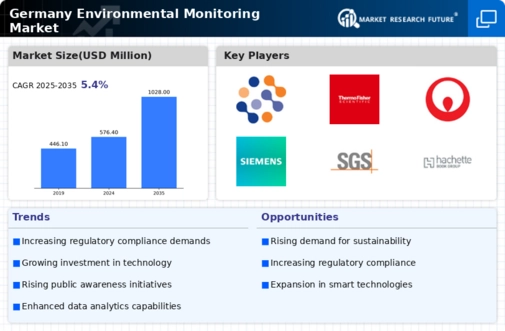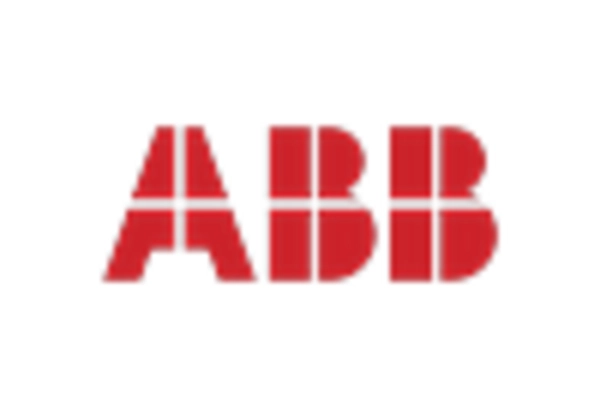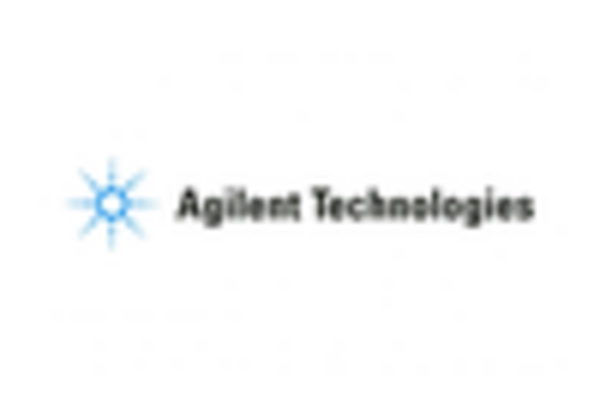Public Health Concerns
Public health concerns related to environmental factors are increasingly influencing the environmental monitoring market in Germany. The rise in respiratory diseases and other health issues linked to air pollution has prompted both government and private sectors to invest in monitoring solutions. Reports indicate that air quality monitoring systems are expected to grow by 20% annually as cities strive to improve public health outcomes. The integration of health data with environmental monitoring systems allows for a more comprehensive understanding of the impacts of pollution on health. This trend highlights the critical role of environmental monitoring in safeguarding public health, thereby driving market demand.
Climate Change Mitigation Efforts
The urgency of climate change mitigation is propelling the environmental monitoring market in Germany. The country has committed to reducing greenhouse gas emissions by 55% by 2030 compared to 1990 levels. This ambitious target necessitates comprehensive monitoring of emissions sources and environmental impacts. The market is likely to expand as organizations and government bodies seek advanced monitoring solutions to track progress and implement effective strategies. Furthermore, the integration of satellite and IoT technologies in monitoring systems enhances data accuracy and accessibility. This trend suggests a growing reliance on innovative technologies to support climate action initiatives, thereby driving market growth.
Government Initiatives and Funding
The environmental monitoring market in Germany is experiencing a boost due to various government initiatives aimed at enhancing environmental protection. The German government has allocated substantial funding, estimated at €1 billion annually, to support projects that monitor air and water quality. This funding is directed towards developing advanced monitoring technologies and infrastructure. Additionally, the government promotes public-private partnerships to foster innovation in environmental monitoring solutions. These initiatives not only enhance the capabilities of monitoring systems but also ensure compliance with stringent environmental regulations. As a result, the market is likely to see increased investment and growth, driven by the need for accurate data to inform policy decisions and improve environmental outcomes.
Industrial Growth and Urbanization
Germany's rapid industrial growth and urbanization are significant drivers of the environmental monitoring market. As industries expand, the demand for monitoring air and water quality intensifies to mitigate pollution and ensure compliance with environmental standards. The industrial sector contributes approximately 30% to Germany's GDP, necessitating robust monitoring systems to track emissions and waste. Urban areas, housing over 75% of the population, face challenges related to air quality and waste management. Consequently, municipalities are investing in environmental monitoring technologies to address these issues. This trend indicates a growing market for solutions that provide real-time data and analytics, essential for managing urban environmental challenges effectively.
Technological Integration and Innovation
The integration of advanced technologies into the environmental monitoring market is reshaping the landscape in Germany. Innovations such as artificial intelligence, machine learning, and big data analytics are enhancing the capabilities of monitoring systems. These technologies enable real-time data collection and analysis, improving the accuracy and efficiency of environmental assessments. The market is projected to grow by 15% annually as organizations adopt these technologies to meet regulatory requirements and improve operational efficiency. Furthermore, the development of user-friendly interfaces and mobile applications is making monitoring data more accessible to stakeholders. This trend indicates a shift towards more sophisticated and integrated monitoring solutions, driving market expansion.

















